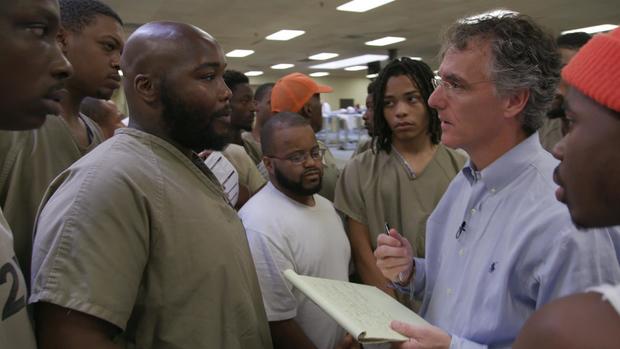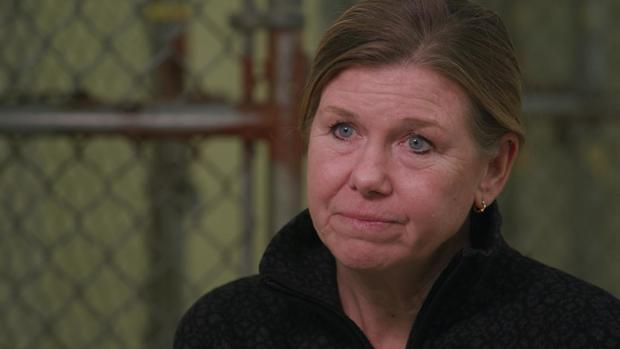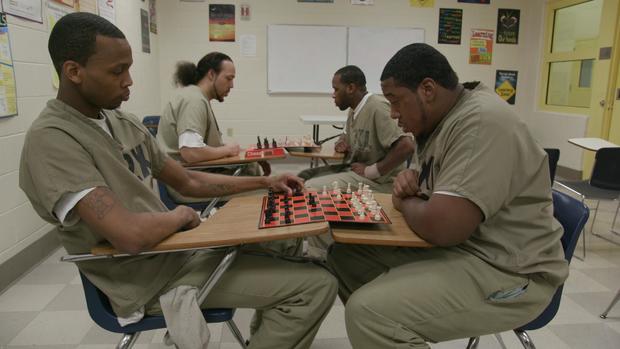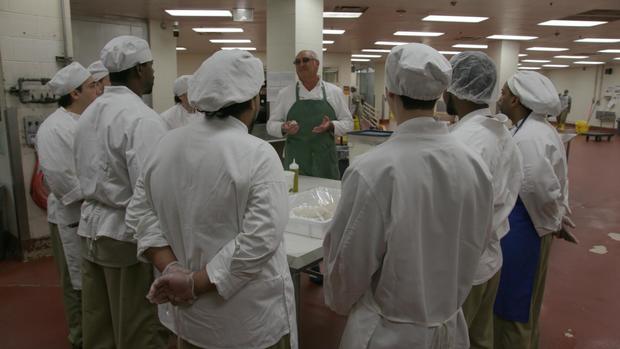Half of the inmates shouldn’t be here, says Cook County sheriff
- Sheriff Tom Dart says Cook County Jail, with a population of about 7,500, has become a dumping ground for the poor and mentally ill.
- Cook County has implemented a mental health program for some inmates that is now a model for other U.S. jails and includes medication, doctor's visits and group therapy.
- Dart's unconventional methods have come under scrutiny as "too soft" and some corrections officers have questioned his loyalty to staff.
Chicago -- with the largest number of murders last year of any major city in the country -- has one of the largest jails in the country.
An average of 70,000 men and women pass thru Cook County Jail each year, many more than once and, as with other big city jails, most of the inmates who cycle through are either poor, mentally ill or members of a gang.
One of the few things Republicans and Democrats, agree on is the need for corrections reform. And Cook County is leading the way -- almost by necessity -- with a new approach to help break the cycle.
The county sheriff, Tom Dart, is getting a lot of the credit. A former prosecutor who's been elected and re-elected sheriff since 2006, Dart -- as you'll see -- is unconventional.
It was a cold day at Cook County Jail when we met Tom Dart. He has redefined the role of sheriff. He sees the job as not just keeping people in jail but helping some of them get out. He says many behind bars shouldn't be there.
"OK, if they're going to make it so that I am going to be the largest mental health provider, we're going to be the best ones."
Tom Dart: How are you guys doing?
Inmate: Pretty good…
Several times a month, Dart mingles with the men in the jail's minimum-security division, all of whom have been charged with low-level, non-violent crimes.
Tom Dart: What's your charge?
Inmate: I had a violation of probation. I was on probation for driving while license revoked.
Dart says the jail – with a population today of about 7,500 -- has become a dumping ground for the poor and mentally ill.
Lesley Stahl: What percent do you think here really shouldn't be here?
Tom Dart: I would suggest conservatively that half of the people here in the jail shouldn't be here. That they don't—
Lesley Stahl: Half?
Tom Dart: They don't pose a danger to anybody. The people in most jails-- in 95 percent of the people in this jail are waiting on a trial. So everybody here are people who haven't been convicted yet. So you say to yourself, "All right, they're presumed innocent. Who is so dangerous that we need to hold them here while we're waiting on a trial?"
Tom Dart: You had some violence a long time ago? Nothing, a long time ago? So nothing.
As he makes the rounds, he sounds less like an incarcerator than a defense attorney.
"Last year alone, we had 1,024 people who spent their entire prison term here in the Cook County Jail, but the more incredible statistic is that same group of people spent an extra 222 years of custody here..."
Tom Dart: I can't-- I'm not promising you guys anything, 'cause I don't know what the hell they're gonna do. But I promise you we will push it.
Inmate: All right.
The biggest problem for most of the inmates, he says, is they simply don't have enough money to make bail.
Inmate: I'm trying to find out why my bond's so high.
Lesley Stahl: How many percentage wise people are really poor and can't afford bail?
Tom Dart: On any given day we have probably 2 to 3 hundred people that if they came up $500 they would leave here but we find that if you have access to money wherever it may come from, and frequently it's coming from your gang and if you happen to be the guy in your gang who is the guy who does most of the shootings, you're a very valuable person, they want you back out on the street. But you have some individual who's in here who's never been a danger to anybody, he can't come up with a hundred dollars. He's sitting…the guy with the gun, he's out the door.
[Tom Dart in meeting: Next guy is possession of cannabis.]
He usually turns his notes over to his top adviser, Cara Smith, who runs what you might call a you-shouldn't-be-here squad.
Cara Smith: And what are you charged with?
Inmate: Retail theft.
Cara Smith: And what did they say you tried to steal?
Inmate: Some Red Bulls.
Cara Smith: Some Red Bull drinks.
Smith and her staff hold "office hours" …looking for inmates they can help.
Cara Smith: What we need to work on is trying to get your bond reduced so that you can bond out, so that you can get out of here.
Inmate: OK.
Cara Smith: OK?
Inmate: Yes.
Cara Smith: OK. Good luck, we'll be in touch
Combing through cases, Cara Smith discovered something disturbing. They call them: "dead days."
Cara Smith: We made up the term but we call them dead days because people spend so much time pre-trial here at the Cook County Jail that once they're sentenced to prison, they've already served their term.
Lesley Stahl: They probably spent more time here than the sentence in some of the cases.
Cara Smith: So last year alone we had 1,024 people who spent their entire prison term here in the Cook County Jail, but the more incredible statistic is that same group of people spent an extra 222 years of custody here in the Cook County Jail.
Lengths of stay run from a week or less to 8 or 9 years. Some of the people who spend years here are the mentally ill, who make up about a third of the population, and are the jail's biggest cost.
Elli Montgomery: And do you know what your charge is today?
Inmate: Retail theft.
Elli Montgomery: Retail theft?
Inmate: $70 worth of ground beef.
Elli Montgomery: $70 worth of ground beef?
Every inmate is screened for mental illness when they first arrive.
Inmate: I was diagnosed as schizophrenic when I was in group home.
Elli Montgomery: In a group home? OK. We're gonna make sure that you get help today.
Inmate: If I don't get the medication that I need, I know it's gonna go wrong.
This man -- who also has a history of mental illness -- has been in and out of the jail 37 times.
Elli Montgomery: I understand.
Lesley Stahl: How does that happen? How does someone come back to a jail 37 times?
Tom Dart: What in God's name do you expect to happen with that person? OK so this person has a serious mental illness, he's not being treated, his family and him have been disconnected for years, he obviously doesn't have a job. He has nowhere to live. What do you think is going to happen? I'll tell you what's going to happen. He will come in contact with law enforcement, either because he's trying to find a place to sleep or he's trying to find something to eat and he'll be back in here. It's not because he walked out of here saying, "Listen, I want to go and commit horrific crimes." It's like he's trying to survive.
Lesley Stahl: In many ways society has turned jails and prisons into mental health clinics and you're actually running one here.
Tom Dart: Yeah. I said, "OK, if they're going to make it so that I am going to be the largest mental health provider, we're going to be the best ones. We're going to treat 'em as a patient while they're here, it's like, we are going to think differently."
Cook County Jail was already one of the largest mental health facilities in the country in 2012, when Chicago closed down half its mental health clinics. These men -- the high-functioning mentally ill -- are bused five days a week to a program that is now a model for other jails across the country. They get medication, visits with psychiatrists, and group therapy.
Counselor: So today I want us to continue to move forward. And you're going to have to have some things that's going to take you to another level.
About 60 percent of all the jail's corrections officers have advanced mental health training. And Dart has moved new people over to the medical facilities.
Tom Dart: What I did is redefined job position and where it would've been a law enforcement position I changed it into a doctor position or a mental health position. And so we've been bringing on a lot of doctors, counselors, therapists, and I have—
Lesley Stahl: Are you running a jail?
Tom Dart: Well, I sometimes I wonder.
Nothing exemplifies his new direction more than who he chose to run the jail. Not someone with a law enforcement background. He named a psychologist to be the warden: 39-year-old Dr. Nneka Jones Tapia.
[Dr. Nneka Jones Tapia in jail: I'm gonna go cell to cell. Who should I talk to?]
She started as an intern at Cook County Jail almost 10 years ago – and worked her way up. As warden, she tries to infuse more humanity into a pretty heartless place – the maximum-security wing, where she offers some tough-love therapy.
Guard: He wouldn't let the officers handcuff him.
Dr. Nneka Jones Tapia: Why is that?
Guard: Put up a fight. They had to take him to the ground and cuff him.
Dr. Nneka Jones Tapia: Are you gonna keep getting into it with staff?
Inmate: If they keep denying my rights.
Dr. Nneka Jones Tapia: OK, see, you have the wrong attitude.
Inmate: I ain't got the wrong attitude.
Dr. Nneka Jones Tapia: Because I'm trying to help you. But you're still telling me that you're gonna have issues with the staff, and I can't have that. So it's up to you.
Lesley Stahl: We filmed you doing rounds like a doctor in a hospital. But you talked to every single inmate that you passed.
Dr. Nneka Jones Tapia: Yes. It's because we understand the person is a person. They're not what…their charge, they're not their crime. And so we want to give that individual attention to as many people as we can.
Dr. Nneka Jones Tapia: Sorry, gentlemen.
On a walk through a medium-security cellblock she works on "attitude adjustment," trying to change their way of thinking so they don't come back here.
Dr. Nneka Jones Tapia: And all of you guys with tattoos. You might want to think about having those removed. You need to cause how are you going to get a job when you get out?
Inmate: Yah.
Dr. Nneka Jones Tapia: I mean cause first impression is everything. You can't do that.
Dr. Nneka Jones Tapia: How many of you guys have kids?
Lesley Stahl: Oh my.
Dr. Nneka Jones Tapia: So it's not just you that's impacted by you being here—
Inmates: It's our families. Our families.
Dr. Nneka Jones Tapia: --but your families, your children.
To reach out to their families, she's listed her phone number on the jail's website. Dart and his methods have come under intense criticism. He's too soft on the inmates, say some of the corrections officers. Their antagonism grew into outright hostility last year when Dart, intending to be transparent about life behind the walls, released videos to the public showing guards brutally beating up inmates.
Dennis Andrews, the business agent at Teamsters Local 700 that represents the corrections officers, says his members were furious.
Dennis Andrews: The anger was he didn't release the videos of the detainees attacking the officers. You can't release a small segment of something happening without releasing a tape of how you got from point A to point B.
Lesley Stahl: Does the public have a right to see those men beating the prisoners?
Tom Dart: If we aren't releasing that information, then it furthers the public's feeling that law enforcement is covering things up, and that we're hiding things, and we don't have anything to hide. We have good people here, is the majority. But we have some people that don't. And we can't shy from that, because it's what poisons the well with the public.
After the criticism, Sheriff Dart did release videos of inmates attacking staff. But Andrews says that didn't improve morale.
Dennis Andrews: He doesn't address the situations of his own staff at the jail who are being attacked daily by detainees. He presumes them innocent but he doesn't presume his staff innocent.
Lesley Stahl: He presumes his staff guilty?
Dennis Andrews: Yes.
Lesley Stahl: It can't be good if they think that you're not on their side?
Tom Dart: You know, I become puzzled when they think I'm not on their side. It is the most difficult job. And you start with that and then. You're dealing with mentally ill folks. So they've been asked to do all sorts of things that they didn't sign up for. And I am outrageously sympathetic to that.
What Sheriff Dart can't tell us yet is whether recidivism rates are coming down. On any given day, he says he releases roughly 200 people to the streets, but he accepts another 200 – some still the old familiar faces. To improve the chances they won't return – again, he's introduced activities like chess lessons.
Tom Dart: People said, you know, "Your chess program. You know, how is that work--" I said, "You know what? One of the major issues we have with the people here-- is they don't think about consequences. "They just think the very first move. They're playing checkers. Chess makes you think four, five, six moves out." I can't tell you how many of the guys in the chess program has told me they never thought like that in their life, that their way of thinking has changed.
There's more than chess. Dart has enlisted volunteers to offer all kinds of classes you rarely see in a jail:
Christopher Jacobs: And you can always move in closer if you want.
A photographer teaches inmates how to find new ways to look at the world and themselves…
Musicians provide therapy through rhythm and sound…
Chef Bruno Abate: Et voila! And we gonna put a little rosemary.
Italian chef, Bruno Abate, gives cooking lessons.
Bruno Abate: I'm not here just to make food, I'm here to change the way you thinking so you don't come back in this place anymore. We say you know we touch the bottom, now we can only go up, right?
Lesley Stahl: What about your corrections officers, do they look at you and say, "Wait a minute, this is all upside down here."
Tom Dart: Yeah, I mean there's definitely employees here that are puzzled by me. You know, Sheriff Goofy is out giving pizza to all the inmates now 'cause he loves them.
Lesley Stahl: Sheriff Goofy?
Tom Dart: Absolutely. Absolutely. I wear it proudly.
Lesley Stahl: People are going to say you're on the wrong side of the street, ya know?
Tom Dart: That's been suggested.
Lesley Stahl: Yeah.
Tom Dart: But, you'll never find anybody that is more strident in going after the bad, the evil, the ones that hurt people. I used to prosecute them. I arrest them now in my Sheriff's office as well. But when it comes to just blindly, and truly out of indifference, just saying there's segments of our society that we will treat this horrifically callous way, I'm not going to be party to that. And if that upsets people, that's fine.
Produced by Deirdre Cohen. Evie Salomon and Andrea Hilbert, associate producers.











